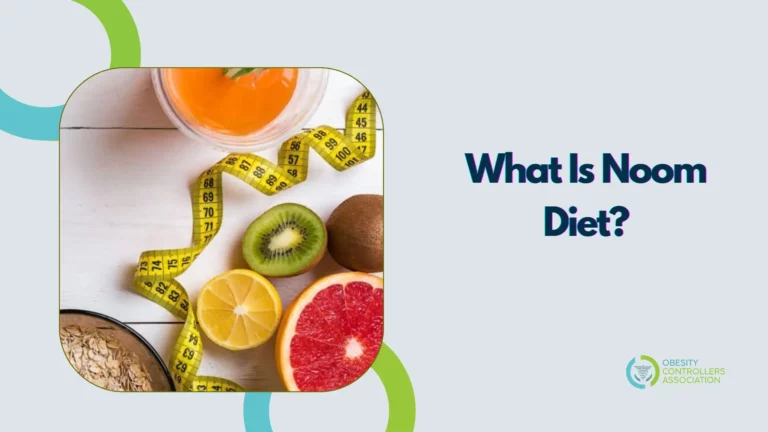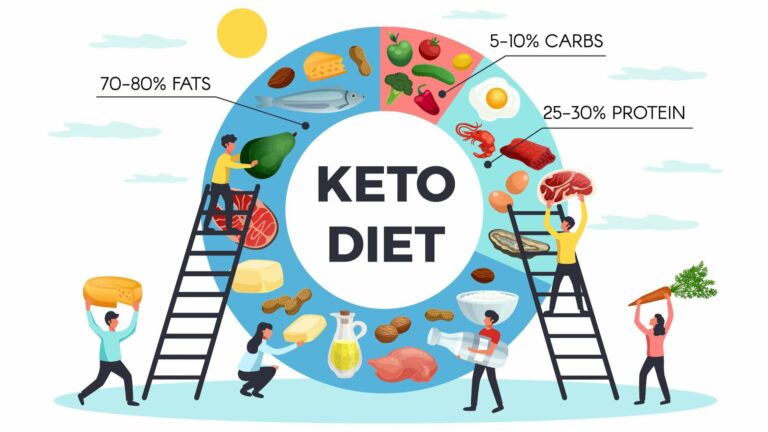Cushing’s Syndrome Diet | What Can I Eat To Reduce?
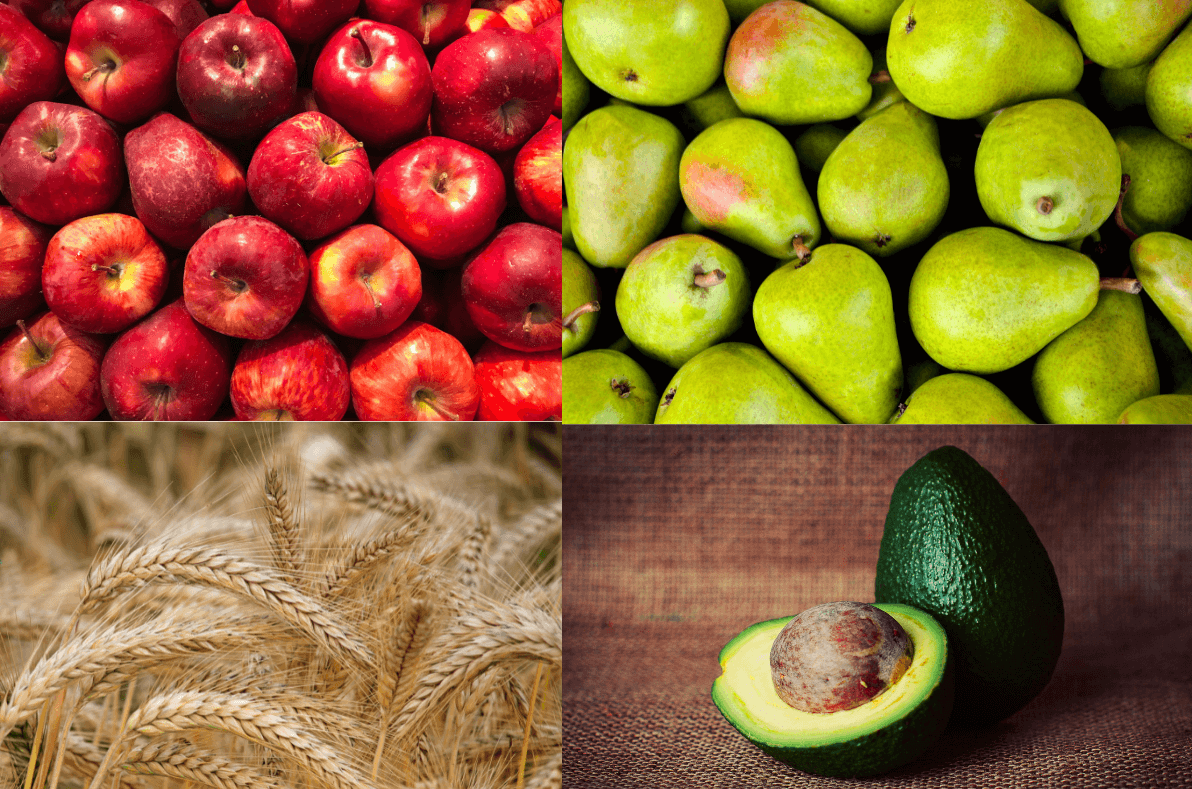
Obesity and overweight are frequent in Cushing’s Syndrome (CS) patients and can continue even after allegedly curative surgery, contributing to cardiometabolic dysfunction and increased cardiovascular risk. Cushing’s illness is characterized by elevated pituitary gland production of adrenocorticotropic hormone (ACTH).
What Is Cushing’s Syndrome Diet?
Cushing’s syndrome (CS), a complicated metabolic disease caused by chronic cortisol exposure, is linked with significant morbidity and death, particularly in connection to cardiovascular events. Obesity is a common symptom of CS, with 70 to 80 percent of patients classified as overweight or obese
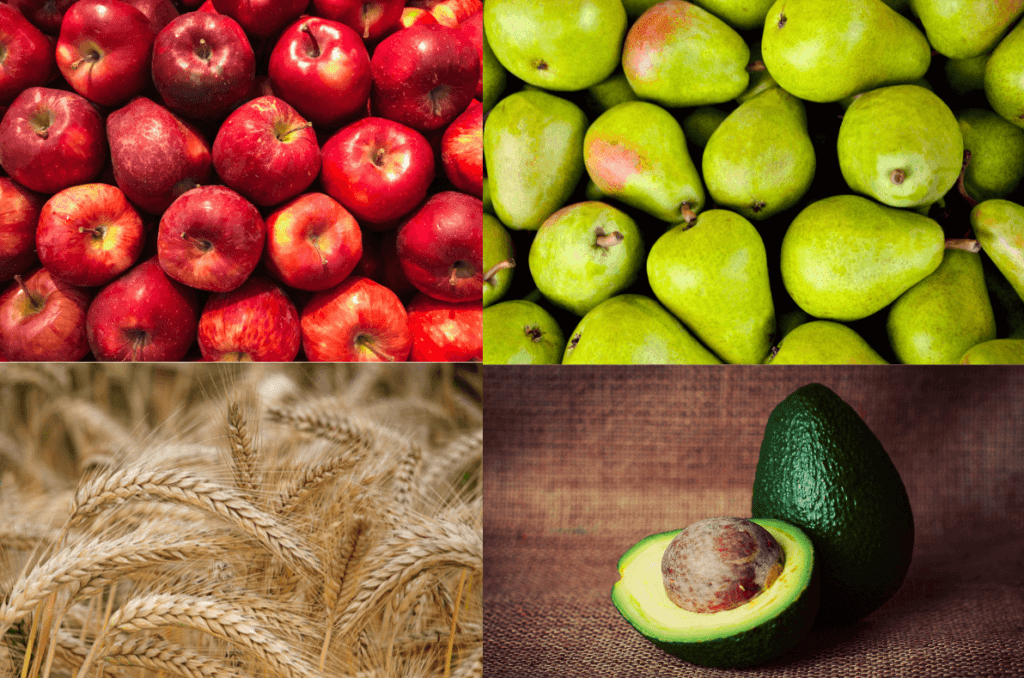
In CS patients, abdominal obesity leads to insulin resistance, metabolic imbalances, and cardiovascular risk. Although the risk of death may reduce after hypercortisolism is controlled, overall mortality and cardiovascular risk remain greater in these people when compared to control groups.
However, mortality is higher in patients with recurrent or persistent hypercortisolism that is, in those for whom remission fails than in control groups. Recurrent disease is a major concern given that long-term recurrence of hypercortisolism after initial surgical success following transsphenoidal pituitary surgery in patients with Cushing’s disease (CD) has been reported in up to 66 percent of patients followed postoperatively for a mean duration of 14 years.
Recent studies support this by demonstrating that body weight can increase after initial recovery even if postoperative biochemical cure occurs, which may be a significant role in the increased cardiovascular risk found even when surgery was successful.
Is ACTH Essential?
ACTH is essential for the creation and release of cortisol, a steroid hormone that is typically generated in reaction to low blood sugar. Cushing’s disease causes hypercortisolism or excessively high cortisol levels in the body.
Because cortisol is required for metabolic activities, Cushing’s hypercortisolism can have a major impact on how the body processes nutrition. The following are some examples: Changes in Cushing’s disease diet might help minimize or alleviate certain symptoms.
Symptoms Of Cushing’s Syndrome
The following are the most prevalent signs of this condition:
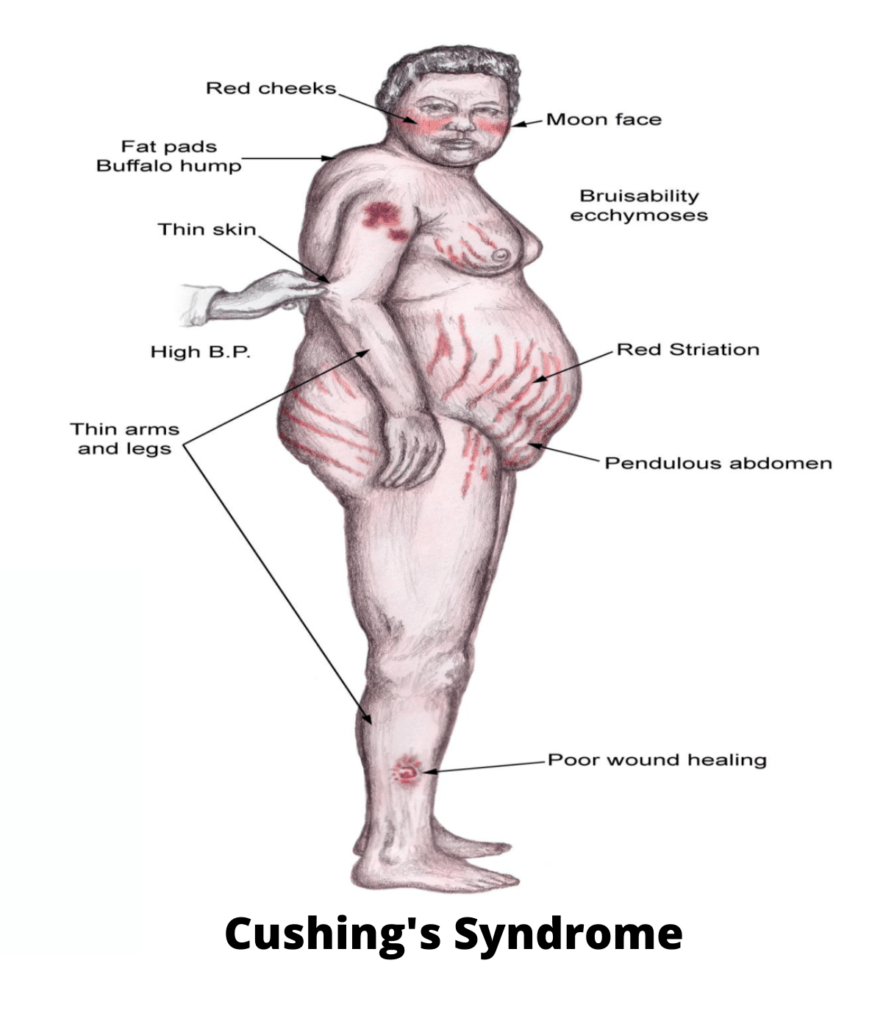
- Weight gain
- Fatty deposits, particularly in the stomach, face (creating a round, moon-shaped face), and between the shoulders and upper back (causing a buffalo hump)
- Stretch marks on the breasts, arms, abdomen, and thighs are purple.
- Skin that is thinner and bruises readily
- Skin injuries that take a long time to heal
- acne
- Exhaustion muscular weakness
Other symptoms that may be noticed in persons with Cushing’s syndrome, in addition to the usual ones listed above, include:
- Elevated blood sugar levels
- Increased thirst resulted in greater urine
- Osteoporosis
- Blood pressure is too high (hypertension)
- Migraine
- Fluctuations in mood
- Anxiety
- Irritability
- Depression
- A rise in the number of infections
Causes And Risk Factors For Cushing’s Syndrome
Cushing’s syndrome occurs when your body has an abnormally high level of cortisol for an extended time. The most prevalent cause is a medicine known as glucocorticoids, sometimes known as corticosteroids, steroids, or prednisone. These prescription steroids are used to treat diseases such as asthma, rheumatoid arthritis, lupus, and following an organ transplant. They are extremely effective anti-inflammatory medicines.
Taking too much for an extended period might result in Cushing’s syndrome. Injectable steroids, such as those used to treat joint pain, bursitis, and back discomfort, can also cause Cushing’s syndrome. Steroid skin creams, which are used to treat eczema and other skin conditions, are less likely to induce Cushing’s syndrome, although it can happen.
A tumour in your pituitary gland, which is located at the base of your brain, or a tumour in your adrenal glands can also cause your body to produce too much cortisol, which can lead to Cushing’s disease. ACTH is a cortisol-regulating hormone. Cushing’s syndrome is caused in rare circumstances by an ACTH-secreting tumour. This type of tumour can grow in an organ that does not naturally generate ACTH, but the tumour causes it to do so. Also, it is not generally a condition that is passed down via families. However, in other rare situations, people have it because a defect in their DNA makes them more prone to develop tumours on their glands.
Diagnosis Of Cushing’s syndrome
Cushing’s syndrome is notoriously difficult to diagnose. This is since many of the symptoms, such as weight gain or weariness, might have other causes. Furthermore, Cushing’s syndrome can be caused by a variety of factors. Your medical history will be reviewed by your healthcare practitioner. They will inquire about your symptoms, any medical problems you may have, and any medications you are taking.
Following that, they may request laboratory testing such as:
- Urine free cortisol test after 24 hours: You will be required to collect your urine during 24 hours for this test. Cortisol levels will then be measured.
- Salivary cortisol measurement: Cortisol levels fall in the evening in persons who do not have Cushing’s syndrome. This test determines the amount of cortisol in a late-collected saliva sample.
- Low-dose dexamethasone suppression test: You will be given a dose of dexamethasone late in the evening for this test. In the morning, your blood will be checked for cortisol levels. Dexamethasone normally lowers cortisol levels. This will not happen if you have Cushing’s syndrome.
- Cushing’s Syndrome Lifestyle Recommendations: Listed below are a variety of lifestyle suggestions that you may incorporate into your Cushing’s syndrome recovery plan. Before making any substantial changes, such as beginning to exercise frequently, consult with your doctor.
- Eat wisely: Make sure you’re consuming healthy meals. Of course, you should eat fruits and vegetables, which are strong in antioxidants, but you should also consume whole grains, lean protein, and healthy fats. These meals provide your body with energy in the form of healthy dosages. Also, make sure you receive adequate calcium and vitamin D in your diet. These minerals assist to build bones, which is essential because bone loss is frequent in patients with Cushing’s disease. If you don’t receive enough of these in your diet, talk to your doctor about taking calcium and vitamin D supplements. A registered dietitian (RD) can assist you in developing a well-balanced meal plan the crucial word here is “well-balanced.” Yes, you may eat the things you enjoy (in moderation), but it’s also vital to eat meals that are good for your health. An RD can also assist you in losing excess weight caused by Cushing’s syndrome.
- Gently Exercise: Exercise is a vital part of any healthy lifestyle, but you should not rush into it. Even if you believe you are feeling better, your body requires time to heal. Begin slowly you might want to try low-impact exercises like water aerobics, tai chi, or yoga. These workouts help to rebuild your muscles and joints gradually. From there, you can go to a more advanced version. You may also work with a personal trainer to create a training plan just for you. Exercising should be pleasurable. Talk to your doctor straight away if you suffer discomfort or other new symptoms while exercising.

- Keep a close eye on your mental wellness: When you have Cushing’s syndrome, your mental health might suffer since depression is frequent. If you’re feeling down or don’t want to do the activities you used to do and you’re not sure why don’t dismiss it. Speak with your doctor; he or she may be able to recommend a psychologist who can assist you in coping with your feelings during your recovery. You should also keep a notebook to document how you feel daily.
- Allow yourself a rest: Don’t be too harsh on yourself as your body heals from Cushing’s syndrome. It is critical to receive enough rest, relaxation, and sleep. Relax with a nice massage, a warm bubble bath, or peaceful music. Now is not the time to push yourself; instead, honour your body and its limitations. Incorporating these lifestyle suggestions into your routine will not only help you live a healthier life but can also help you live longer.
- Cushing’s disease diet: Do’s and Don’t’s: Because cortisol is required for metabolic activities, Cushing’s hypercortisolism can have a major impact on how the body processes nutrition. The following are some examples: Dietary modifications for Cushing’s disease can help minimise symptoms.
- Lowering salt intake: Excess salt can aggravate Cushing’s symptoms by raising blood pressure and promoting weight gain. Reduce sodium intake by avoiding processed meals and minimising the amount of salt added to food.
- Increasing calcium and vitamin D intake: Because calcium and vitamin D builds bones, physicians prescribe a calcium and vitamin D-rich diet for patients with Cushing’s disease. This includes kale, cheese, and broccoli, as well as vitamin D-fortified milk and drinks. Multivitamins are also high in calcium and vitamin D. Adults should aim for 800 mg of calcium and 5 to 15 micrograms of vitamin D per day, with vitamin D consumption rising with age.
- Lowering cholesterol: High cholesterol levels are a frequent sign of Cushing’s disease. Avoiding fatty meals and increasing your intake of high-fibre foods such kidney beans, apples, pears, barley, and prunes may help counterbalance the consequences of increased cholesterol.
- Blood sugar control: Cortisol stimulates the liver, causing blood sugar levels to rise, thus patients with Cushing’s disease who have chronically high cortisol levels may also have high blood sugar. This disorder, also known as hyperglycaemia, has been related to some long-term consequences such as cardiovascular disease, nerve damage, renal damage, and bone and joint difficulties. A doctor can advise you on how to space out your meals throughout the day to keep your blood sugar levels in balance.
- Reducing or eliminating the use of alcohol and tobacco: Many doctors advise patients to cut back on their alcohol and cigarette consumption. Chronic, excessive drinking can harm the hypothalamic-pituitary-adrenal axis hormone network, causing symptoms similar to Cushing’s. Pseudo-Cushing syndrome might not only exacerbate the symptoms of pre-existing Cushing’s illness but also make it more difficult to treat. Tobacco usage raises the likelihood of problems during surgery. Quitting smoking can lower the risk of surgical complications if surgery has been selected as a therapeutic option for Cushing’s.

- Foods You Can Easily Consume: Cold-water, wild-caught seafood such as salmon or sardines can help decrease inflammation and regulate emotions. Healthy fats promote brain function and help us to produce essential hormones. Aside from seafood, incorporate nuts/seeds, avocado, olive oil, and coconut oil in your diet regularly.
- B vitamin-rich foods: We require B vitamins to turn nutrients into energy and to support brain activities. Raw or cultured dairy products, cage-free eggs, grass-fed beef, wild-caught fish, poultry, brewer’s yeast, and green leafy vegetables should all be included in your diet.
- Calcium, potassium, and magnesium-rich foods: Electrolytes are natural muscle relaxants that are essential for general health. They also aid in the reduction of symptoms such as headaches, difficulty sleeping, pains, high blood pressure, and others. To avoid electrolyte imbalances, consume more unsweetened organic yoghurt, wild-caught salmon, beans/legumes, leafy green vegetables, cruciferous vegetables such as broccoli, avocados, and almonds.
- High-protein foods: Protein-rich meals offer amino acids required for appropriate neurotransmitter activity, as well as aiding in hunger control and tiredness management.
Food Items To Avoid
The following is a list of foods that should be avoided.
- Trans Fat Vegetable & Seed Oil
- Fruit Juice
- Chocolate Sensitive Foods
- Fat-Free Cake Flavoured Yogurts
- Carbohydrates with a low fibre content
- Caffeine
Treatment For Cushing’s syndrome
The overall objective of Cushing’s syndrome treatment is to reduce cortisol levels in your body. This can be achieved in a variety of ways. The treatment you receive will be determined by the cause of your disease. Your doctor may recommend a medicine to help you regulate your cortisol levels. Some drugs reduce cortisol production in the adrenal glands or ACTH production in the pituitary gland. Other medicines prevent cortisol from acting on your tissues. Ketoconazole (Nizoral), mitotane (Lysodren), and metyrapone are a few examples (Metopirone).
Conclusion On Cushing’s Syndrome Diet
The earlier you begin treatment, the better the outcome. It is critical to recognise that your Cushing syndrome diet is a key component in your treatment. Also, the food may be consumed and does not need to be taken care of for the treatment to go well. Your symptoms may take some time to improve.
Make sure to consult your healthcare professional for appropriate eating advice and to keep track of your progress. Above all, support groups can assist you in coping with Cushing’s disease. Your local hospital or healthcare practitioner can offer you information about local support groups.


